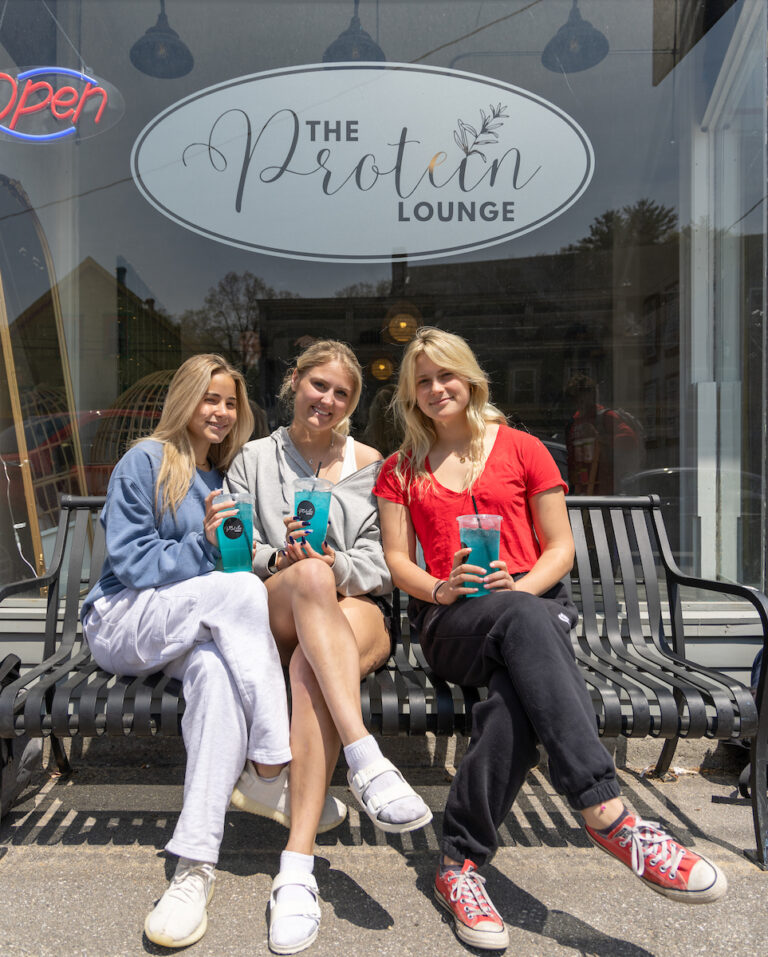By: Bryan Geary
Months into their Legacy Project to benefit a local women’s shelter, the light went off for classmates Annie Dunlop ’23, Ashley Lafond-Sanchez ’23, and Emma Markwick ’23. “I called to check on our progress and they were the sweetest people I had ever talked to,” says Lafond-Sanchez. “They said, ‘I can’t believe you all are doing this. We’ve received donations from other people but never in these amounts.’”
“It made me realize that we actually did something that impacted this organization on a greater scale than I could have imagined,” Markwick says with a smile. “It just felt really good.”
For Markwick and her teammates on this project, it was an affirmation of their choice and their decisionmaking process. The cause was close to their hearts for personal reasons and that made all the difference in their motivation, their collaboration, and ultimately their final product.
The concept is simple. Required of all graduating students, the Legacy Project is a, “student-selected exploration of a topic that results in a significant piece of work designed to leave a legacy.” From fundraisers to events to physical artifacts such as a bench or a mural, ask a Tilton student past or present about their project and you’ll see a breadth of different directions. The common thread, says Dean of Teaching and Learning Katherine McCandless, is that the final product should be a manifestation of mastery learning.
“As we continue to evolve Legacy Projects, I see it as a template for our mastery learning record,” says McCandless. Rooted in the Mastery Approach, Tilton’s fundamental approach to teaching and learning, this transcript of sorts would distill years of learning into a tangible learning record that shows mastery of the five essential skills. “The Legacy Project is the culmination of all those strands.”
To achieve that across the board, says McCandless, there is a renewed focus on the process. For all projects, the question is not simply, “What is your final product?” The important learning comes from asking how the project is researched, how is it marketed and communicated, and how it works within the parameters of the community. Put differently, the Legacy Project is not the event or the fundraiser, it is the work behind the scenes that demonstrates mastery of Tilton’s essential skills.
The work of Dunlop, Lafond-Sanchez, and Markwick — who thanked this year’s Legacy Project Coordinator, Eliza Smith, and their advisors for their support along the way — is a perfect demonstration of this type of learning. Originally set on raising funds to support a cause that held personal significance, their work ended up being part community service, part entrepreneurship, and part marketing. Through a partnership with The Protein Lounge, a favorite local spot of Tilton students for coffee and smoothies, their group created a signature drink that was added to the public menu, with a portion of the proceeds going to Ozanam Place, the aforementioned nonprofit organization in Franklin, NH. Though she hadn’t taken the school’s entrepreneurship course, says Lafond-Sanchez, she tapped into the experience of The Protein Lounge’s owner, as well as peers who had taken the class. That type of outside-the-classroom learning led to a deeper understanding of realworld skills like marketing, managing money, and pitching an idea.
“It’s all about the idea of showing what you know, and that you’re never done learning,” says Julie Donahue, an English faculty member who will be supervising next year’s Legacy Projects. “How can we give back to the community through education or volunteerism to create a larger connection with the topic for our students?”
The culture around Legacy Projects, says Donahue, should be celebratory. “It’s a chance to celebrate what you’ve learned and give back to the place that has given that to you. Whether it’s been a year or four years, how can you make your mark and leave it better for the next group of kids?”

Evelynn Irizarry ’23 expressed that exact sentiment when talking about her own project, an openmic night in support of the arts at Tilton. A two-sport varsity athlete who also participates in theatre, Irizarry set out to do something that would allow more space for artistic expression on campus. “I wanted to send the message that regardless of your interests, you are still a valued member of our community,” she says. “I would be ecstatic if my project helps people continue to recognize how important it is for everyone at Tilton to be comfortable showcasing their abilities.”
With 60 attendees at her first event, and several unexpected participants in the impromptu karaoke portion of the evening, Irizarry hopes her project was a good start.
Although the idea of a culminating project is nothing new to Tilton or other secondary schools, the difference, says McCandless, is the Mastery Approach. “It’s a differentiator because of personalization,” continues McCandless. “We owe it to our students to give them this opportunity to demonstrate their strengths by choosing something that matters to them, not something we’re telling them should matter.”
“This project is the capstone of their experience and all the things we do well,” reflects Donahue. “From design thinking in the ninth-grade program to our student experience block to the development of essential skills, we are funneling everything we do towards this celebration of student learning.”